Don't wanna be here? Send us removal request.
Text
The Birds
Small, Bright, and Lively

Crack Willow and Bluebird in New Mexico by Akseli Gallen-Kallela
The Bluebird
A winged bit of Indian sky Strayed hither from its home on high.
—Alexander Posey

Havstrutar.Great Black-backed Gulls by Bruno Liljefors
A Bird
His haunts are by the brackish ways Where rivers and sea-currents meet; He is familiar with the sprays, Over the stones his flight is fleet. Low, low he flutters, like a rat That scampers up a river-bank; Swift, lizard-like, he scours the flat Where pools are wersh and weeds are dank, The fresh green smell of inland groves, The pureness of the upper air, Are poorer than his pungent coves That hold strange spices everywhere. Strong is the salt of open sea; Far out, the virgin brine is keen: No home is there for such as he, Out of the beach he is not seen. By shallows and capricious foams Are the queer corners he frequents, And in an idle humour roams The borderland of elements. —A. Y. Campbell

Stilleben mit Blaumeise/Still Life with a Blue Tit by Georg Flegel
The Titmouse
If you would happy company win, Dangle a palm-nut from a tree, Idly in green to sway and spin, Its snow-pulped kernel for bait; and see, A nimble titmouse enter in.
Out of earth's vast unknown of air, Out of all summer, from wave to wave, He'll perch, and prank his feathers fair, Jangle a glass-clear wildering stave, And take his commons there —
This tiny son of life; this spright, By momentary Human sought, Plume will his wing in the dappling light, Clash timbrel shrill and gay — And into time's enormous nought, Sweet-fed, will flit away.
—Walter de la Mare

Eine Meise auf einem Ast/Tit on a Branch by Christoph Ludwig Agricola
#literature#poetry#dark academia#light academia#inspiration#classic academia#walter de la mare#bruno liljefors#alexander posey
2 notes
·
View notes
Text
The Bees
Of Honey, Flowers, and Bees

Least Bee
Least Bee that brew – A Honey’s Weight The Summer multiply – Content Her smallest fraction help The Amber Quantity –
—Emily Dickinson

Bee-Master
I have known honey from the Syrian hills Stored in cool jars; the wild acacia there On the rough terrace where the locust shrills Tosses her spindrift on the ringing air. Narcissus bares his nectarous perianth In white and golden tabard to the sun, And while the workers rob the amaranth Or scarlet windflower low among the stone, Intent upon their crops, The Syrian queens mate in the high hot day Rapt visionaries of creative fray; Soaring from fecund ecstasy alone, And, through the blazing ether, drops Like a small thunderbolt the vindicated drone. But this is the bee-master's reckoning In England. Walk among the hives and hear. Forget not bees in winter, though they sleep. For winter's big with summer in her womb, And when you plant your rose-trees, plant them deep, Having regard to bushes all aflame, And see the dusky promise of their bloom In small red shoots, and let each redolent name- Tuscany, Crested Cabbage, Cottage Maid- Load with full June November's dank repose, See the kind cattle drowsing in the shade, And hear the bee about his amorous trade Brown in the gipsy crimson of the rose. In February, if the days be clear, The waking bee, still drowsy on the wing, Will sense the opening of another year And blunder out to seek another spring. Crashing through winter sunlight's pallid gold His clumsiness sets catkins on the willow Ashake like lambs' tails in the early fold, Dusting with pollen all his brown and yellow, But when the rimy afternoon turns cold And undern squalls buffet the chilly fellow, He'll seek the hive's warm waxen welcoming And set about the chambers' classic mould. And then, pell-mell, his harvest follows swift, Blossom and borage, lime and balm and clover, On Downs the thyme, on cliffs the scantling thrift, Everywhere bees go racing with the hours, For every bee becomes a drunken lover, Standing upon his head to sup the flowers, All over England, from Northumbrian coasts, To the wild sea-pink blown on Devon rocks. Over the merry southern gardens, over The grey-green bean-fields, round the Sussex oasts, Through the frilled spires of cottage hollyhocks, Go the big brown fat bees, and blunder in Where dusty spears of sunlight cleave the barn, And seek the sun again, and storm the whin, And in the warm meridian solitude Hum in the heather round the moorland tarn, Look, too, when summer hatches out the brood, In tardy May or early June, And the young queens are strong in the cocoon, Watch, if the days be warm, The flitting of the swarm. Follow, for if beyond your sight they stray Your bees are lost, and you must take your way Homeward disconsolate, but if you be at hand Then you may take your bees on strangers' land. Have your skep ready, drowse them with, your smoke, Whether they cluster on the handy bough Or in the difficult hedge, be nimble now, For bees are captious folk And quick to turn against the lubber's touch, But if you shake them to their wicker hutch Firmly, and turn towards the hive your skep, Into the hive the clustered thousands stream, Mounting the little slatted sloping step, A ready colony, queen, workers, drones, Patient to build again the waxen thrones For younger queens, and all the chambered cells For lesser brood, and all the immemorial scheme. And still they labour, though the hand of man Inscrutable and ravaging descend, Pillaging in their citadels, Defeating wantonly their provident plan, Making a havoc of their patient hoard; Still start afresh, not knowing to what end, Not knowing to what ultimate reward, Or what new ruin of the garnered hive The senseless god in man will send. Still their blind stupid industry will strive, Constructing for destruction pitiably, That still their unintelligible lord May reap his wealth from their calamity.
—Vita Sackville-West

Honey Harvest
Late in March, when the days are growing longer And sight of early green Tells of the coming spring and suns grow stronger, Round the pale willow-catkins there are seen The year's first honey-bees Stealing the nectar: and bee-masters know This for the first sign of the honey-flow.
Then in the dark hillsides the Cherry-trees Gleam white with loads of blossom where the gleams Of piled snow lately hung, and richer streams The honey. Now, if chilly April days Delay the Apple-blossom, and the May's First week come in with sudden summer weather, The Apple and the Hawthorn bloom together, And all day long the plundering hordes go round And every overweighted blossom nods. But from that gathered essence they compound Honey more sweet than nectar of the gods.
Those blossoms fall ere June, warm June that brings The small white Clover. Field by scented field, Round farms like islands in the rolling weald, It spreads thick-flowering or in wildness springs Short-stemmed upon the naked downs, to yield A richer store of honey than the Rose, The Pink, the Honeysuckle. Thence there flows Nectar of clearest amber, redolent Of every flowery scent That the warm wind upgathers as he goes.
In mid-July be ready for the noise Of million bees in old Lime-avenues, As though hot noon had found a droning voice To ease her soul. Here for those busy crews Green leaves and pale-stemmed clusters of green strong flowers Build heavy-perfumed, cool, green-twilight bowers Whence, load by load, through the long summer days They fill their glassy cells With dark green honey, clear as chrysoprase, Which housewives shun; but the bee-master tells This brand is more delicious than all else.
In August-time, if moors are near at hand, Be wise and in the evening-twilight load Your hives upon a cart, and take the road By night: that, ere the early dawn shall spring And all the hills turn rosy with the Ling, Each waking hive may stand Established in its new-appointed land Without harm taken, and the earliest flights Set out at once to loot the heathery heights.
That vintage of the Heather yields so dense And glutinous a syrup that it foils Him who would spare the comb and drain from thence Its dark, full-flavoured spoils: For he must squeeze to wreck the beautiful Frail edifice. Not otherwise he sacks Those many-chambered palaces of wax.
Then let a choice of every kind be made, And, labelled, set upon your storehouse racks — Of Hawthorn-honey that of almond smacks: The luscious Lime-tree-honey, green as jade: Pale Willow-honey, hived by the first rover: That delicate honey culled From Apple-blossom, that of sunlight tastes: And sunlight-coloured honey of the Clover. Then, when the late year wastes, When night falls early and the noon is dulled And the last warm days are over, Unlock the store and to your table bring Essence of every blossom of the spring. And if, when wind has never ceased to blow All night, you wake to roofs and trees becalmed In level wastes of snow, Bring out the Lime-tree-honey, the embalmed Soul of a lost July, or Heather-spiced Brown-gleaming comb wherein sleeps crystallised All the hot perfume of the heathery slope. And, tasting and remembering, live in hope.
—Martin Armstrong

Yellow Roses and Bees, Pink Roses and Wasps, unidentified artist, formerly attributed to Zhao Chang, Qing Dynasty, courtesy The Metropolitan Museum of Art
#literature#poetry#classic#dark academia#classic academia#qing#bees#vita sackville west#emily dickinson
2 notes
·
View notes
Text
May Botanicals
For Early Summer

Chardons by Edouard Manet
Thistledown
This might have been a place for sleep, But, as from that small hollow there Hosts of bright thistledown begin Their dazzling journey through the air, An idle man can only stare.
They grip their withered edge of stalk In brief excitement for the wind; They hold a breathless final talk, And when their filmy cables part One almost hears a little cry.
Some cling together while they wait, And droop and gaze and hesitate, But others leap along the sky, Or circle round and calmly choose The gust they know they ought to use;
While some in loving pairs will glide, Or watch the others as they pass, Or rest on flowers in the grass, Or circle through the shining day Like silvery butterflies at play.
Some catch themselves to every mound, Then lingeringly and slowly move As if they knew the precious ground Were opening for their fertile love: They almost try to dig, they need So much to plant their thistle-seed.
Harold Monro

Plants Growing Near a Wall by John Constable
All Nettles
Tall nettles cover up, as they have done These many springs, the rusty harrow, the plough Long worn out, and the roller made of stone: Only the elm butt tops the nettles now. This corner of the farmyard I like most: As well as any bloom upon a flower I like the dust on the nettles, never lost Except to prove the sweetness of a shower.
—Edward Thomas

Iris by Vincent van Gogh
Sea Iris I
Weed, moss-weed, root tangled in sand, sea-iris, brittle flower, one petal like a shell is broken, and you print a shadow like a thin twig.
Fortunate one, scented and stinging, rigid myrrh-bud, camphor-flower, sweet and salt—you are wind in our nostrils.
II
Do the murex-fishers drench you as they pass? Do your roots drag up colour from the sand? Have they slipped gold under you— rivets of gold?
Band of iris-flowers above the waves, you are painted blue, painted like a fresh prow stained among the salt weeds.
—Hilda Doolittle

Yellow Irises by Claude Monet
#literature#poetry#classic#dark academia#inspiration#classic academia#claude monet#edouard manet#vincent van gogh#hilda doolittle#john constable#harold monro#spring#spring poetry
1 note
·
View note
Text
Of Hope and Hillsides
"I will be the gladdest thing..."

Sångtrasten/Song Thrush by Bruno Liljefors
“Hope” is the Thing With Feathers
“Hope” is the thing with feathers— That perches in the soul— And sings the tune without the words— And never stops—at all—
And sweetest—in the Gale—is heard— And sore must be the storm— That could abash the little Bird That kept so many warm—
I’ve heard it in the chillest land— And on the strangest Sea— Yet—never—in Extremity, It asked a crumb—of me.
—Emily Dickinson

Young Girl with a Bird by Berthe Morisot

Farmhouse in Provence by Vincent van Gogh
On the Grasshopper and the Cricket
The Poetry of earth is never dead: When all the birds are faint with the hot sun, And hide in cooling trees, a voice will run From hedge to hedge about the new-mown mead; That is the Grasshopper’s—he takes the lead In summer luxury,—he has never done With his delights; for when tired out with fun He rests at ease beneath some pleasant weed. The poetry of earth is ceasing never: On a lone winter evening, when the frost Has wrought a silence, from the stove there shrills The Cricket’s song, in warmth increasing ever, And seems to one in drowsiness half lost, The Grasshopper’s among some grassy hills.
—John Keats

Dauphine Landscape by Pierre Bonnard
Afternoon on a Hill
I will be the gladdest thing Under the sun! I will touch a hundred flowers And not pick one.
I will look at cliffs and clouds With quiet eyes, Watch the wind bow down the grass, And the grass rise.
And when lights begin to show Up from the town, I will mark which must be mine, And then start down!
—Edna St. Vincent Millay

Vue d’Auvers by Paul Cezanne
#literature#poetry#classic#inspiration#books & libraries#classic academia#vincent van gogh#john keats#paul cezanne#pierre bonnard#edna st. vincent millay#emily dickinson#berthe morisot#hope#grasshopper
3 notes
·
View notes
Text
Pools by the Sea
Poetry and Paintings from the Seaside

Seacoast, Gloucester by John Sloane
The Rock Pool
This is the Sea. In these uneven walls A wave lies prisoned. Far and far away, Outward to ocean, as the slow tide falls, Her sisters, through the capes that hold the bay, Dancing in lovely liberty recede. But lovely in captivity she lies, Filled with soft colours, where the waving weed Moves gently, and discloses to our eyes Blurred shining veins of rock and lucent shells Under the light-shot water, and here repose Small quiet fish, and dimly-glowing bells Of sleeping sea-anemones that close Their tender fronds and will not now awake Till on these rocks the waves returning break.
—Edward Shanks

Pools by the Seaside by William Hart
Ebb
I know what my heart is like Since your love died: It is like a hollow ledge Holding a little pool Left there by the tide, A little tepid pool, Drying inward from the edge.
—Edna St. Vincent Millay

Woman at the Beach by Santeri Salokivi
Sonnet LXXV
One day I wrote her name upon the strand, But came the waves and washed it away: Again I wrote it with a second hand; But came the tide, and made my pains his prey. “Vain man,” said she, “that dost in vain assay A mortal thing so to immortalize; For I my self shall like to this decay, And eke my name be wiped out likewise.” “Not so,” quoth I; “let baser things devise To die in dust, but you shall live by fame: My verse your virtues rare shall eternise, And in the heavens write your glorious name. Where, when as death shall all the world subdue, Our love shall live, and later life renew.”
—Edmund Spenser, from Amoretti

Isles of Shoals, Broad Cove by Childe Hassam
#literature#poetry#classic#dark academia#inspiration#classic academia#childe hassam#john sloane#edna st. vincent millay#edmund spenser
2 notes
·
View notes
Text
Voices of April
Breezes, Blossoms, and Birds
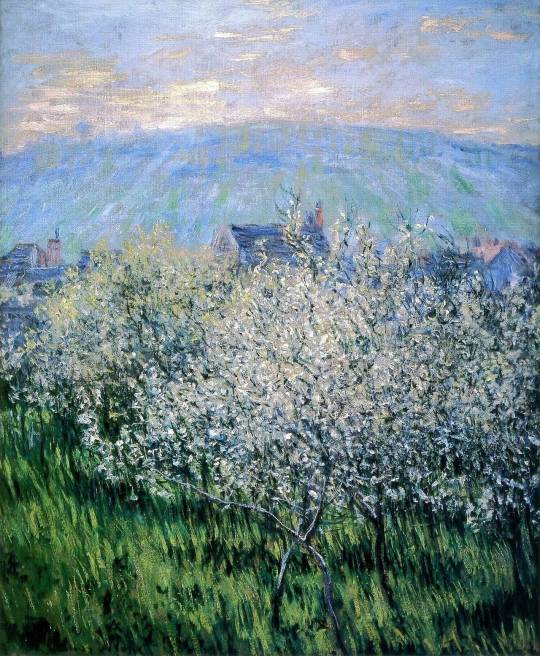
Prunieurs en Fleurs/Plum Trees in Bloom by Clause Monet
The West Wind
It’s a warm wind, the west wind, full of birds’ cries; I never hear the west wind but tears are in my eyes. For it comes from the west lands, the old brown hills, And April’s in the west wind, and daffodils.
It’s a fine land, the west land, for hearts as tired as mine, Apple orchards blossom there, and the air’s like wine. There is cool green grass there, where men may lie at rest, And the thrushes are in song there, fluting from the nest.
‘Will ye not come home, brother? ye have been long away, It’s April, and blossom time, and white is the may; And bright is the sun, brother, and warm is the rain,— Will ye not come home, brother, home to us again?
‘The young corn is green, brother, where the rabbits run, It’s blue sky, and white clouds, and warm rain and sun. It’s song to a man’s soul, brother, fire to a man’s brain, To hear the wild bees and see the merry spring again.
‘Larks are singing in the west, brother, above the green wheat, So will ye not come home, brother, and rest your tired feet? I’ve a balm for bruised hearts, brother, sleep for aching eyes,’ Says the warm wind, the west wind, full of birds’ cries.
It’s the white road westwards is the road I must tread To the green grass, the cool grass, and rest for heart and head, To the violets and the warm hearts and the thrushes’ song, In the fine land, the west land, the land where I belong.
-John Masefield

De Roze Perzikboom/Blossoming Pear Tree by Vincent van Gogh
Home Thoughts, From Abroad
O, to be in England Now that April 's there, And whoever wakes in England Sees, some morning, unaware, That the lowest boughs and the brushwood sheaf Round the elm-tree bole are in tiny leaf, While the chaffinch sings on the orchard bough In England—now!
And after April, when May follows, And the whitethroat builds, and all the swallows! Hark, where my blossom'd pear-tree in the hedge Leans to the field and scatters on the clover Blossoms and dewdrops—at the bent spray's edge— That 's the wise thrush; he sings each song twice over, Lest you should think he never could recapture The first fine careless rapture! And though the fields look rough with hoary dew, All will be gay when noontide wakes anew The buttercups, the little children's dower —Far brighter than this gaudy melon-flower!
—Robert Browning
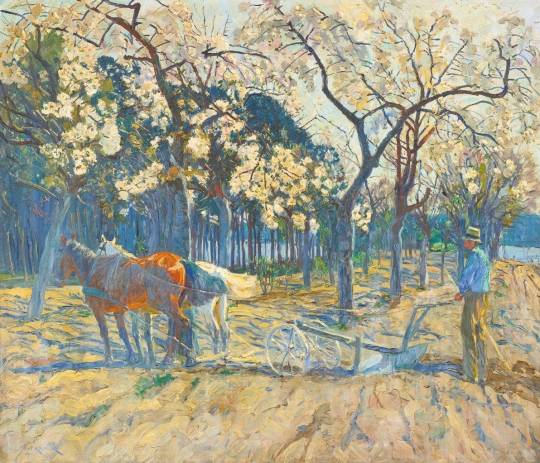
Song of a Second April
April this year, not otherwise Than April of a year ago, Is full of whispers, full of sighs, Of dazzling mud and dingy snow; Hepaticas that pleased you so Are here again, and butterflies.
There rings a hammering all day, And shingles lie about the doors; In orchards near and far away The grey woodpecker taps and bores; And men are merry at their chores, And children earnest at their play.
The larger streams run still and deep, Noisy and swift the small brooks run Among the mullein stalks the sheep Go up the hillside in the sun, Pensively,—only you are gone, You that alone I cared to keep.
—Edna St. Vincent Millay

Pear Blossoms by Winslow Homer
#literature#poetry#classic#inspiration#books & libraries#claude monet#edna st vincent millay#winslow homer#phillipp franck#robert browning#vincent van gogh#john masefield#classic academia#april poetry#spring poetry
3 notes
·
View notes
Text
The Ageless Garden
Poems and Paintings of Timeless Summer
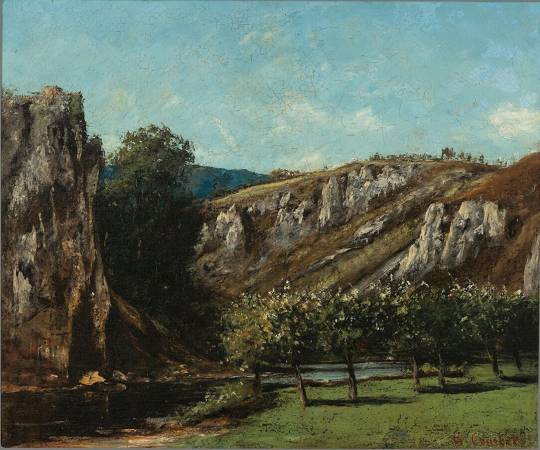
Mountainous Landscape with Fruit Orchard Near Ornans by Gustave Courbet
All That’s Past
Very old are the woods; And the buds that break Out of the briar's boughs, When March winds wake, So old with their beauty are— Oh, no man knows Through what wild centuries Roves back the rose.
Very old are the brooks; And the rills that rise Where snow sleeps cold beneath The azure skies Sing such a history Of come and gone, Their every drop is as wise As Solomon.
Very old are we men; Our dreams are tales Told in dim Eden By Eve's nightingales; We wake and whisper awhile, But, the day gone by, Silence and sleep like fields Of amaranth lie.
—Walter de la Mare
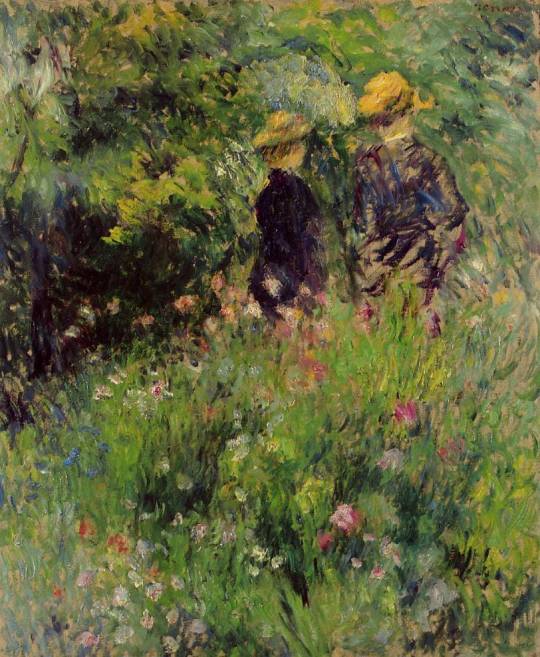
Conversation in a Rose Garden by Auguste Renoir
Sonnet
This little space which scented box encloses Is blue with lupins and is sweet with thyme. My garden all is overblown with roses, My spirit all is overblown with rhyme, And like a drunken honeybee I waver From house to garden and again to house, And, undetermined which delight to favour, On verse and rose alternately carouse. Adam, were you, in your primeval plenty, A poet and a gardener in one? Did you with easy songs the blossoms sheave, In Eden where the blooms by ten and twenty Sprang up beneath the magic of the sun, To deck the brows of your capricious Eve?
—Vita Sackville-West
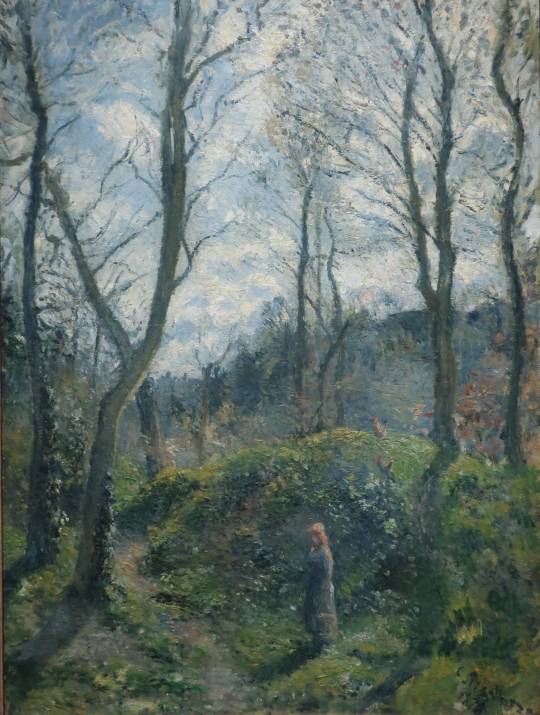
Woodland Scene, Spring by Camille Pissarro
Journey
Ah, could I lay me down in this long grass And close my eyes, and let the quiet wind Blow over me,—I am so tired, so tired Of passing pleasant places! All my life, Following Care along the dusty road, Have I looked back at loveliness and sighed; Yet at my hand an unrelenting hand Tugged ever, and I passed. All my life long Over my shoulder have I looked at peace And now I fain would lie in this long grass And close my eyes. Yet onward! Cat-birds call Through the long afternoon, and creeks at dusk Are guttural. Whip-poor-wills wake and cry, Drawing the twilight close about their throats. Only my heart makes answer. Eager vines Go up the rocks and wait; flushed apple-trees Pause in their dance and break the ring for me; Dim, shady wood-roads, redolent of fern And bayberry, that through sweet bevies thread Of round-faced roses, pink and petulant, Look back and beckon ere they disappear. Only my heart, only my heart responds. Yet, ah, my path is sweet on either side All through the dragging day,—sharp underfoot, And hot, and like dead mist the dry dust hangs— But far, oh, far as passionate eye can reach, And long, ah, long as rapturous eye can cling, The world is mine: blue hill, still silver lake, Broad field, bright flower, and the long white road A gateless garden, and an open path: My feet to follow, and my heart to hold.
—Edna St. Vincent Millay
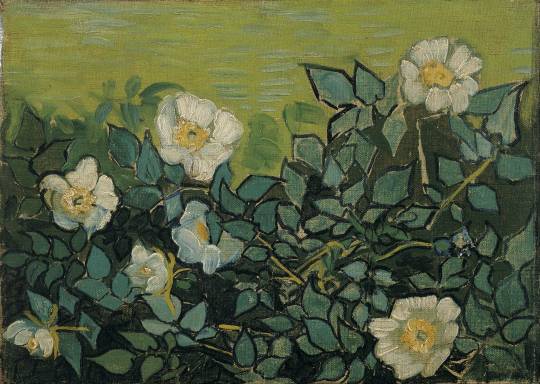
Wild Roses by Vincent van Gogh
#literature#poetry#dark academia#classic#light academia#inspiration#books & libraries#classic academia#edna st vincent millay#pierre auguste renoir#camille pissarro#vincent van gogh#walter de la mare#vita sackville west#gustave courbet
1 note
·
View note
Text
March Days
The Newest Season

Calligraphic Galleon, Ottoman, by Abdul Qadir Hisari
Cargoes
Quinquireme of Nineveh from distant Ophir, Rowing home to haven in sunny Palestine, With a cargo of ivory, And apes and peacocks, Sandalwood, cedarwood, and sweet white wine.
Stately Spanish galleon coming from the Isthmus, Dipping through the Tropics by the palm-green shores, With a cargo of diamonds, Emeralds, amethysts, Topazes, and cinnamon, and gold moidores.
Dirty British coaster with a salt-caked smoke stack, Butting through the Channel in the mad March days, With a cargo of Tyne coal, Road-rails, pig-lead, Firewood, iron-ware, and cheap tin trays.
--John Masefield
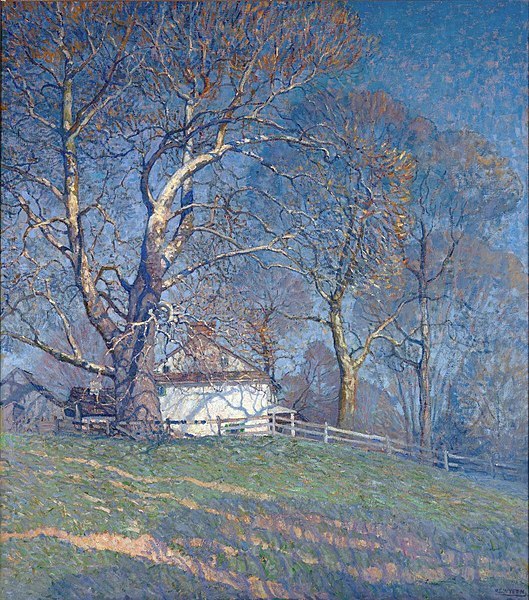
Buttonwood Farm by N. C. Wyeth
A Fairy-Tale Spring
And then she danced….
Where are you, Hyacinth? There is a lover waiting for you somewhere, my dear.
It is the first of Spring. The blackbird opens his yellow beak, and whistles cool and clear. There is blue magic in the morning; the sky, deep-blue above, melts into white where it meets the hills. The wind waits for you up yonder—will you go to meet it? Ah, stay here! The hedges have put on their green coats for you; misty green are the tall elms from which the rooks are chattering. Along the clean white road, between the primrose banks, he comes. Will you be round this corner?——or the next? He is looking for you, Hyacinth.
(She rested, breathless, and then danced again.)
It is summer afternoon. All the village is at rest save one. "Cuck-oo!" comes from the deep dark trees; "Cuck-oo!" he calls again, and flies away to send back the answer. The fields, all green and gold, sleep undisturbed by the full river which creeps along them. The air is heavy with the scent of may. Where are you, Hyacinth? Is not this the trysting-place? I have waited for you so long! . . .
She stopped, and the watcher in the bushes moved silently away, his mind aflame with fancies.
—A. A. Milne, from Once on a Time
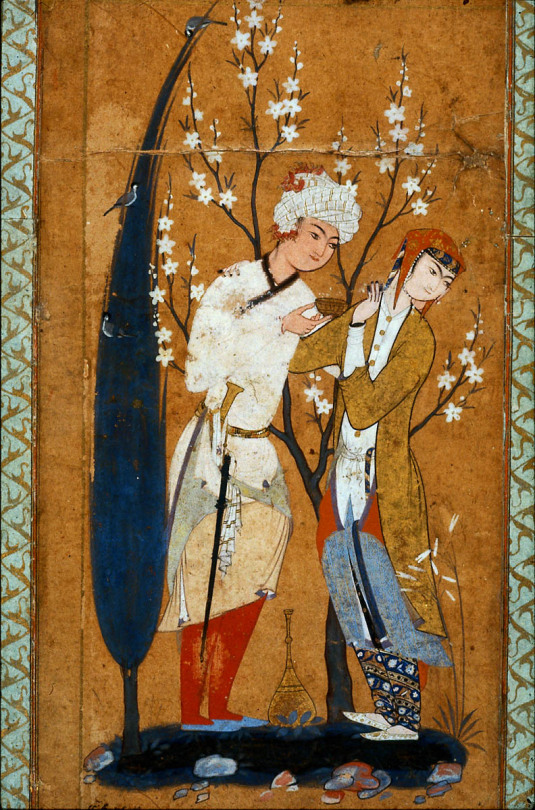
Lovers in a Landscape by Muhammadi
Spring
VII
O Eyes, go forth the Spring to view, That smiles upon our Plains anew. A Heavenly Child in cradling Flowers, Sweet Breath from Skies unclouded drew. The Morning Breeze his Nurse, that rocked His Cradle, with soft Lullings due. The Baby feigns to sleep, and blinks, Shutting his little Eyelids two. And when the Lids are oped again, The Eyebrows drip with sparkling Dew. The Bees hum round and busy sip The Nectar, and make Honey new. O come, and let the Baby's smiles And Laughter, pierce thee through and through. O come, and leave your wintry Cell, And let Heaven's Light thy Life renew. And build new Cells with honey'd Wax, Plann'd like the Bees' six-sided, true. And warmed by radiant Fire of Flowers, Old Winter's reign of Death undo. Regret is dead; Love lives again; New Life transforms the Landscape's Hue. Bold enter, then, green Spring's loved Haunts, And drink fresh Wine, nor fear to rue. And drinking full Love's sweetest Draught, The glowing Heart new Love shall woo. Love wakes afresh in Earth and Heaven; The Rose in green, the Sun in blue. O Nightingale, behold thy Rose! O Eagle, thy bright Sun pursue!
—Jeláleddín Rumi, translated by William Hastie, DD
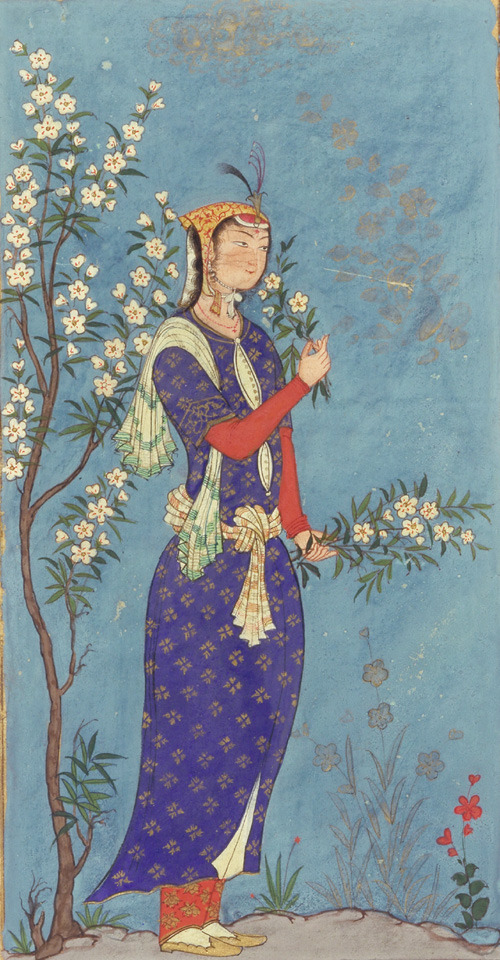
Woman with a Spray of Flowers from Safavid Iran circa 1575
#literature#poetry#dark academia#light academia#classic#inspiration#books & libraries#classic academia#rumi#a.a. milne#john masefield#persian miniature painting#n.c. wyeth
7 notes
·
View notes
Text
Quietude
Van Gogh, Brooke, and Other Purveyors of Wisdom

Cornfield with Crows by Vincent van Gogh
Youth in Age
ONCE I was part of the music I heard On the boughs or sweet between earth and sky; For joy of the beating of wings on high My heart shot into the breast of the bird.
I hear it now and I see it fly, And a life in wrinkles again is stirred; My heart shoots into the breast of the bird, As it will for sheer love till the last long sigh.
—George Meredith

Intérieur blanc/White Interior by Pierre Bonnard
The Long Small Room
THE long small room that showed willows in the west Narrowed up to the end the fireplace filled, Although not wide. I liked it. No one guessed What need or accident made them so build. Only the moon, the mouse, and the sparrow peeped In from the ivy round the casement thick. Of all they saw and heard there they shall keep The tale for the old ivy and older brick. When I look back I am like moon, sparrow, and mouse That witnessed what they could never understand Or alter or prevent in the dark house. One thing remains the same—this is my right hand Crawling crab-like over the clean white page, Resting awhile each morning on the pillow, Then once more starting to crawl on towards age. The hundred last leaves stream upon the willow.
—Edward Thomas
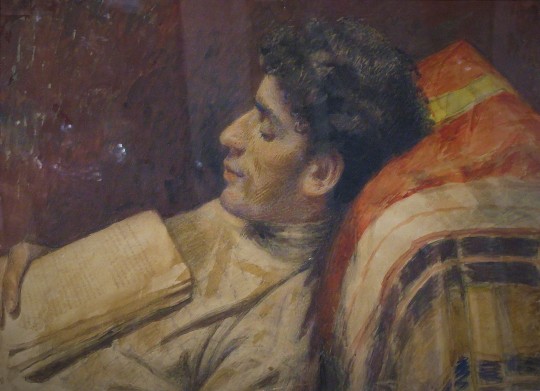
Sleeping Man with a Book by Yehuda Pen
The Busy Heart
NOW that we've done our best and worst, and parted, I would fill my mind with thoughts that will not rend. (O heart, I do not dare go empty-hearted) I'll think of Love in books, Love without end; Women with child, content; and old men sleeping; And wet strong ploughlands, scarred for certain grain; And babes that weep, and so forget their weeping; And the young heavens, forgetful after rain; And evening hush, broken by homing wings; And Song's nobility, and Wisdom holy, That live, we dead. I would think of a thousand things, Lovely and lovable, and taste them slowly, One after one, like tasting a sweet food. I have need to busy my heart with quietude.
—Rupert Brooke

Rain by Vincent van Gogh
#vincent van gogh#yeduda pen#pierre bonnard#rupert brooke#edward thomas#george meredith#literature#poetry#light academia#dark academia#classic#inspiration#books & libraries#classic academia
12 notes
·
View notes
Text
Looking into the Garden
Life and Love

Geraniums by Childe Hassam
Portrait by a Neighbour
Before she has her floor swept Or her dishes done, Any day you’ll find her A-sunning in the sun!
It’s long after midnight Her key’s in the lock, And you never see her chimney smoke Till past ten o’clock!
She digs in her garden With a shovel and a spoon, She weeds her lazy lettuce By the light of the moon.
She walks up the walk Like a woman in a dream, She forgets she borrowed butter And pays you back cream!
Her lawn looks like a meadow, And if she mows the place She leaves the clover standing And the Queen Anne’s lace!
—Edna St. Vincent Millay
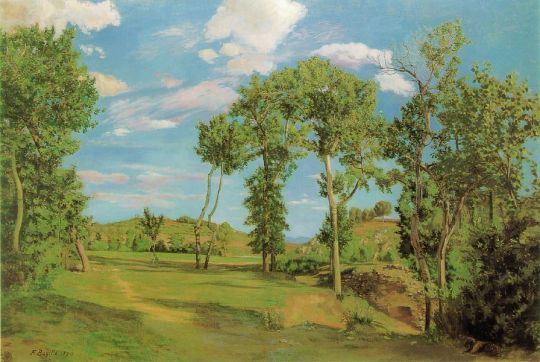
Paysage au Bord du Lez by Frederic Bazille
Heartsease Country
TO ISABEL SWINBURNE
The far green westward heavens are bland, The far green Wiltshire downs are clear As these deep meadows hard at hand: The sight knows hardly far from near, Nor morning joy from evening cheer. In cottage garden-plots their bees Find many a fervent flower to seize And strain and drain the heart away From ripe sweet-williams and sweet-peas At every turn on every way.
But gladliest seems one flower to expand Its whole sweet heart all round us here; ’Tis Heartsease Country, Pansy Land. Nor sounds nor savours harsh and drear Where engines yell and halt and veer Can vex the sense of him who sees One flower-plot midway, that for trees Has poles, and sheds all grimed or grey For bowers like those that take the breeze At every turn on every way.
Content even there they smile and stand, Sweet thought’s heart-easing flowers, nor fear, With reek and roaring steam though fanned, Nor shrink nor perish as they peer. The heart’s eye holds not those more dear That glow between the lanes and leas Where’er the homeliest hand may please To bid them blossom as they may Where light approves and wind agrees At every turn on every way.
Sister, the word of winds and seas Endures not as the word of these Your wayside flowers whose breath would say How hearts that love may find heart’s ease At every turn on every way.
—Charles Algernon Swinburne
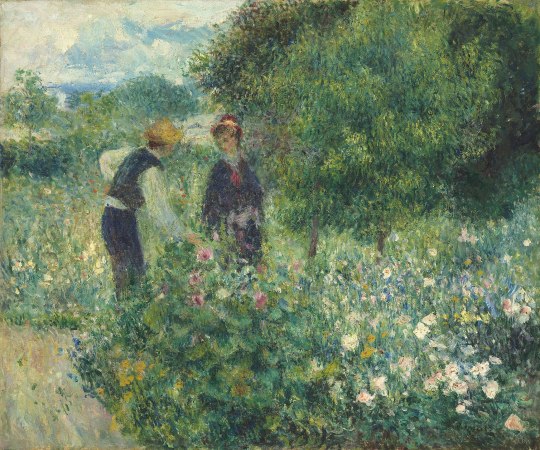
Picking Flowers by Auguste Renoir
The Flower's Name
Here's the garden she walked across, Arm in my arm, such a short while since: Hark, now I push its wicket, the moss Hinders the hinges and makes them wince! She must have reached this shrub ere she turned, As back with that murmur the wicket swung; For she laid the poor snail, my chance foot spurned, To feed and forget it the leaves among. Down this side of the gravel-walk She went while her robe's edge brushed the box: And here she paused in her gracious talk To point me a moth on the milk-white phlox. Roses, ranged in valiant row, I will never think that she passed you by! She loves you, noble roses, I know; But yonder, see, where the rock-plants lie! This flower she stopped at, finger on lip, Stooped over, in doubt, as settling its claim; Till she gave me, with pride to make no slip, Its soft meandering Spanish name: What a name! Was it love or praise? Speech half-asleep or song half-awake? I must learn Spanish, one of these days, Only for that slow sweet name's sake. Roses, if I live and do well, I may bring her, one of these days, To fix you fast with as fine a spell, Fit you each with his Spanish phrase; But do not detain me now; for she lingers There, like sunshine over the ground, And ever I see her soft white fingers Searching after the bud she found. Flower, you Spaniard, look that you grow not, Stay as you are and be loved forever! Bud, if I kiss you 't is that you blow not, Mind, the shut pink mouth opens never! For while it pouts, her fingers wrestle, Twinkling the audacious leaves between, Till round they turn and down they nestle— Is not the dear mark still to be seen? Where I find her not, beauties vanish; Whither I follow her, beauties flee; Is there no method to tell her in Spanish June 's twice June since she breathed it with me? Come, bud, show me the least of her traces, Treasure my lady's lightest footfall! —Ah, you may flout and turn up your faces— Roses, you are not so fair after all!
—Robert Browning

Still Life with Flowers by Edouard Manet
#literature#poetry#dark academia#light academia#classic#inspiration#books & libraries#classic academia#pierre auguste renoir#childe hassam#algernon charles swinburne#edna st vincent millay#robert browning#edouard manet#frederic bazille
20 notes
·
View notes
Text
March Botanicals
A Glory of New Blooms
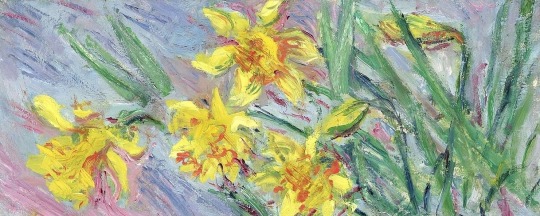
Jonquilles by Claude Monet
To Daffodils
Fair Daffodils, we weep to see You haste away so soon; As yet the early-rising sun Has not attain'd his noon. Stay, stay, Until the hasting day Has run But to the even-song; And, having pray'd together, we Will go with you along.
We have short time to stay, as you, We have as short a spring; As quick a growth to meet decay, As you, or anything. We die As your hours do, and dry Away, Like to the summer's rain; Or as the pearls of morning's dew, Ne'er to be found again.
—Robert Herrick

Basket of Primulas by Koloman Moser
Primroses in the Wood Appear
Primroses in the woods appear Their sulphur coloured flowers Are the wan heralds of the year In March's varying hours
And by the mossy hedge they spring In sulphur shining bloom What time the thrush begins to sing And sallow catkins come
Beneath the white thorn vivid green How beautiful they look Maple and hazle bush beturns Beside the gulphing brook
How sweetly shine the fairey flowers Near gravel paved streams Foretelling Aprils dewy showers As rich as Julias dreams
Green linnets peck the pated flowers In March's kindling vest I'll crop some blooms in these wild hours For Julia's happy breast
—John Clare
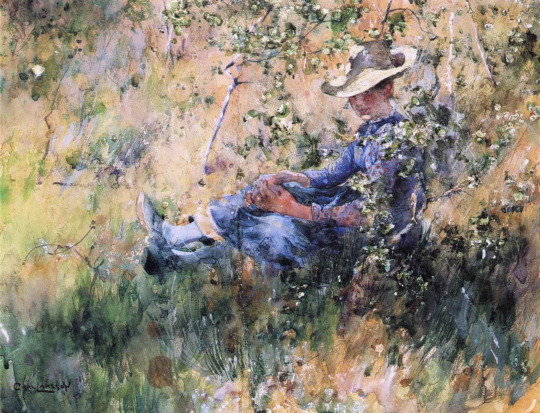
Girl by a Flowering Hawthorn Bush by Carl Larsson
Down Here the Hawthorn
Down here the hawthorn.... And a stir of wings, Spring-lit wings that wake Sudden tumult in the brake, Tumult of blossom tide, tumult of foaming mist Where the bright bird's tumultuous feathers kissed. White mists are blinding me, White mist of hedgerow, white mist of wings. Down here the hawthorn And a stir of wings.... Softly swishing, swift with spray All along the green laneway Dewdimmed, sunwashed, windsweet and winter-free They flash upon the light, They swing across the sight, I cannot see, I cannot see!... Down here the flowering hawthorn flings Sleet of petals, petalled shells Spread the coloured air that sings Magic and a myriad spells Spun by my count of Springs. Down here the hawthorn.... And the flower-foam stirred By a Spring-lit bird. White hawthorn mist is blinding me. I lower my gaze, and on this old Brown bridle road Crusted with golden moss and mould The hedgerow flings Lush carpetings, Blossom woven carpetings light lain Under the farmer's lumbering load; And, floating past the spent March wrack, The footstep trail, the traveller's track. Down here the hawthorn.... White mists are blinding me, White mists that rime the fresh green bank Where fernleaf-fall And sorrel tall Upwaving, rank on rank, Shall flush the bed whereon the windflowers sank. I turn these Spring-bewildered eyes of mine, I seek above the surf of hedgerow line Where peeping branches reach, and reaching twine Faint cherry or plum or eglantine. But with pretence of whisperings The year's young mischief-wind shall take By storm these shy striplings, And soon or later shake Their slender limbs, and make Free with their clinging may-- Strip from them in a single boisterous day Their first and last vesture of pale bloom spray. So, as to meet such lack In bush or brack, The kindly hedgerows make Sure of a Springtime for these frailer things, Shedding on each the lavish creamthorn flake. Down here the hawthorn.... On all the green leaf-clusters round me clings Thickly a spray of gentle blossomings Everywhere as with many bells The young year with white magic swells. The morning rings. White mist is blinding me, I cannot see, I cannot see! Blind grows the coloured air that sings The marvel of a myriad spells Spun by my count of Springs. Sleet of petals, petalled shells Falling with sudden poignancy (As the sleet stings) Upon the lightheart-hope which only clear sight knows. And slowly drifts, Lingering among the snows Nor, though the snow lifts, Ever goes The wistful heartache as the fresh Spring flows With slipping sureness to the time of the rose, and the withered rose. Down here the hawthorn.... And heaping blossom stirred By a joy-swift bird. White mists are blinding me, White mist of hedgerow, white mist of wings. The bird's flight flings Deep carpetings Over the wrack Of my life's track. Down here the hawthorn.... The air of coloured years is blurred By the Spring, by a bird. White mists are blinding me, White mists on the years to be. I cannot see, I cannot see....
—Thomas Moult
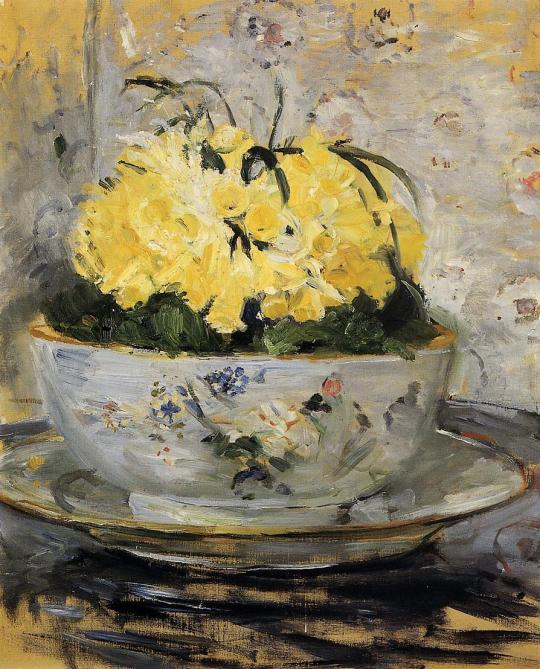
Daffodils by Berthe Morisot
#March poetry#literature#poetry#classic academia#classic#light academia#dark academia#inspiration#john clare#robert herrick#claude monet#berthe morisot#Kolomon Moser#daffodil#primroses#hawthorn
5 notes
·
View notes
Text
Myths in the Morning
Tales of Long Ago

Apollo and Daphne by Francesco Albani
Daphne
Why do you follow me?— Any moment I can be Nothing but a laurel-tree.
Any moment of the chase I can leave you in my place A pink bough for your embrace.
Yet if over hill and hollow, Still it is your will to follow, I am off;—to heel, Apollo!
—Edna St. Vincent Millay

Pan by Giovanni Antonio Pellegrini
A Musical Instrument
What was he doing, the great god Pan, Down in the reeds by the river? Spreading ruin and scattering ban, Splashing and paddling with hoofs of a goat, And breaking the golden lilies afloat With the dragon-fly on the river.
He tore out a reed, the great god Pan, From the deep cool bed of the river: The limpid water turbidly ran, And the broken lilies a-dying lay, And the dragon-fly had fled away, Ere he brought it out of the river.
High on the shore sat the great god Pan While turbidly flowed the river; And hacked and hewed as a great god can, With his hard bleak steel at the patient reed, Till there was not a sign of the leaf indeed To prove it fresh from the river.
He cut it short, did the great god Pan, (How tall it stood in the river!) Then drew the pith, like the heart of a man, Steadily from the outside ring, And notched the poor dry empty thing In holes, as he sat by the river.
‘This is the way,’ laughed the great god Pan (Laughed while he sat by the river), 'The only way, since gods began To make sweet music, they could succeed.’ Then, dropping his mouth to a hole in the reed, He blew in power by the river.
Sweet, sweet, sweet, O Pan! Piercing sweet by the river! Blinding sweet, O great god Pan! The sun on the hill forgot to die, And the lilies revived, and the dragon-fly Came back to dream on the river. Yet half a beast is the great god Pan, To laugh as he sits by the river, Making a poet out of a man: The true gods sigh for the cost and pain,— For the reed which grows nevermore again As a reed with the reeds in the river.
—Elizabeth Barrett Browning

Orpheus Leading Eurydice from the Underworld by Jean-Baptiste Camille Corot
Orpheus With His Lute
Orpheus with his lute made trees, And the mountain tops that freeze, Bow themselves when he did sing: To his music plants and flowers Ever sprung; as sun and showers There had made a lasting spring. Every thing that heard him play, Even the billows of the sea, Hung their heads, and then lay by. In sweet music is such art, Killing care and grief of heart Fall asleep, or hearing, die.
—William Shakespeare from Henry VIII
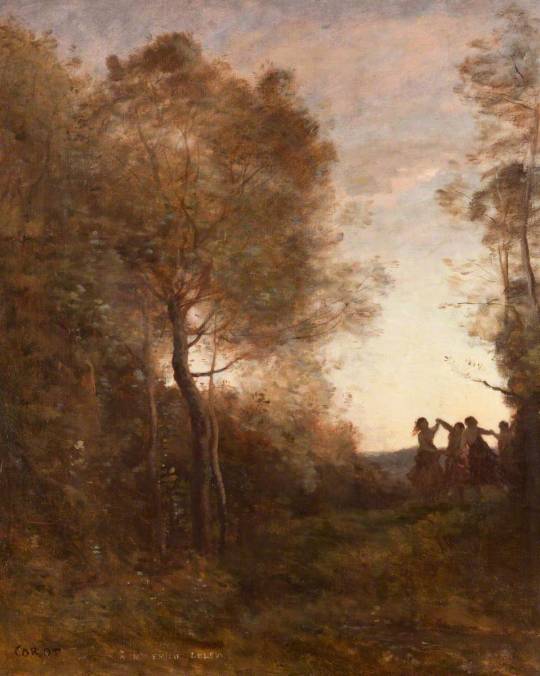
Le Soir: La Danse des Nymphes/Evening: the Dance of the Nymphs by J-B Camille Corot
#literature#poetry#dark academia#light academia#classic#inspiration#books & libraries#classic academia#mythology#greek mythology#greek gods#william shakespeare#elizabeth barrett browning#edna st vincent millay#jean baptiste camille corot
2 notes
·
View notes
Text
From the Water's Edge
Poetry and Paintings From the Ocean

Seascape Study With Rain Cloud, John Constable
Eel-Grass
No matter what I say, All that I really love Is the rain that flattens on the bay, And the eel-grass in the cove; The jingle-shells that lie and bleach At the tide-line, and the trace Of higher tides along the beach: Nothing in this place.
—Edna St. Vincent Millay

Le Pêcheur/The Fisherman by Edouard Manet
The Fish
Although you hide in the ebb and flow Of the pale tide when the moon has set, The people of coming days will know About the casting out of my net,
And how you have leaped times out of mind Over the little silver cords, And think that you were hard and unkind, And blame you with many bitter words.
—William Butler Yeats

Coquille/Seashell by Odilon Redon
Seashells
I picked up shells with ruby lips That spoke in whispers of the sea, Upon a time, and watched the ships, On white wings, sail away to sea.
The ships I saw go out that day Live misty—dim in memory; But still I hear, from far away, The blue waves breaking ceaselessly.
—Alexander Posey

Sandy Beach with Breakers, Winslow Homer
#literature#poetry#academia#dark academia#light academia#classic#inspiration#english major#edna st vincent millay#william butler yeats#alexander posey#winslow homer#edouard manet#ocean#melancholia
5 notes
·
View notes
Text
February Botanical
A Month for Pansies
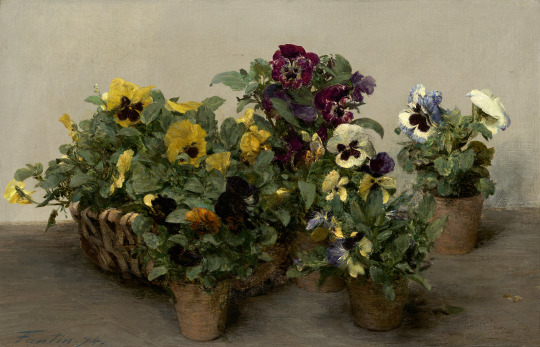
Pansies by Henri Fantin-Latour, National Gallery of Art
Heartsease in My Garden Bed
Heartsease in my garden bed, With sweetwilliam white and red, Honeysuckle on my wall:— Heartsease blossoms in my heart When sweet William comes to call, But it withers when we part, And the honey-trumpets fall.
—Christina Rossetti
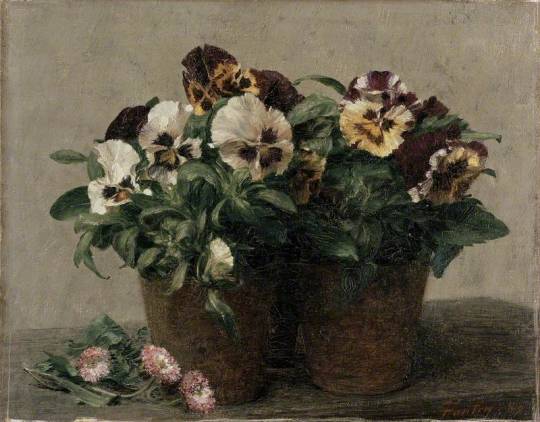
Still Life with Pansies by Henri Fantin-Latour, Ashmolean Museum
Heartsease
There is a flower I wish to wear, But not until first worn by you— Heartsease—of all earth’s flowers most rare; Bring it; and bring enough for two.
—Walter Savage Landor
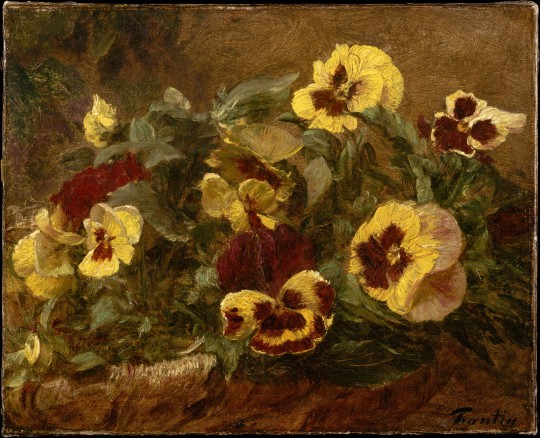
Pansies by Henri Fantin-Latour, the Metropolitan Museum of Art
I'm the little Heart's Ease
I'm the little "Heart's Ease"! I don't care for pouting skies! If the Butterfly delay Can I, therefore, stay away?
If the Coward Bumble Bee In his chimney corner stay, I must resoluter be! Who'll apologize for me?
Dear, Old fashioned, little flower! Eden is old fashioned, too! Birds are antiquated fellows! Heaven does not change her blue. Nor will I, the little Heart's Ease Ever be induced to do!
—Emily Dickinson

Still Life with Pansies by Henri Fantin-Latour, the Metropolitan Museum of Art
#literature#poetry#dark academia#light academia#classic#inspiration#books & libraries#henri fantin latour#christina rossetti#emily dickinson#February
6 notes
·
View notes
Text
Silences
Poems of Solitude and Stillness
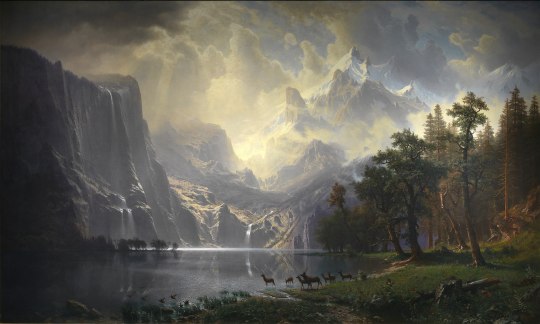
Among the Sierra Nevada Mountains by Albert Bierstadt
Solitude
To sit on rocks, to muse o'er flood and fell, To slowly trace the forest's shady scene, Where things that own not man's dominion dwell, And mortal foot hath ne'er or rarely been; To climb the trackless mountain all unseen, With the wild flock that never needs a fold; Alone o'er steeps and foaming falls to lean This is not solitude, 'tis but to hold Converse with Nature's charms, and view her stores unrolled.
But midst the crowd, the hurry, the shock of men, To hear, to see, to feel and to possess, And roam alone, the world's tired denizen, With none who bless us, none whom we can bless; Minions of splendour shrinking from distress! None that, with kindred consciousness endued, If we were not, would seem to smile the less Of all the flattered, followed, sought and sued; This is to be alone; this, this is solitude!
More blest the life of godly eremite, Such as on lonely Athos my be seen, Watching at eve upon the giant height, Which looks o'er waves so blue, skies so serene, That he who there at such an hour hath been Will wistful linger on that hallow'd spot; Then slowly tear him from the witching scene, Sigh forth one wish that such had been his lot, Then turn to hate a world he had almost forgot.
—George Gordon, Lord Byron, from Childe Harold’s Pilgrimage
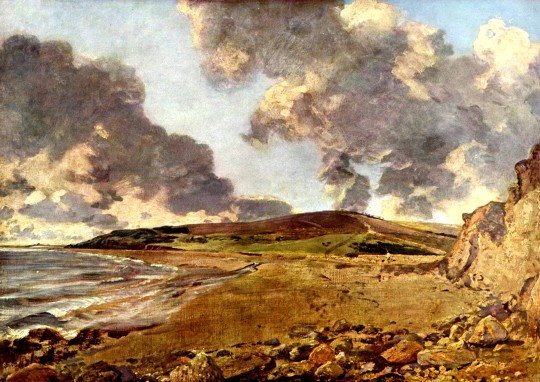
Weymouth Bay by John Constable
A Solitude
Sea beyond sea, sand after sweep of sand, Here ivory smooth, here cloven and ridged with flow Of channelled waters soft as rain or snow, Stretch their lone length at ease beneath the bland Grey gleam of skies whose smile on wave and strand Shines weary like a man’s who smiles to know That now no dream can mock his faith with show, Nor cloud for him seem living sea or land.
Is there an end at all of all this waste, These crumbling cliffs defeatured and defaced, These ruinous heights of sea-sapped walls that slide Seaward with all their banks of bleak blown flowers Glad yet of life, ere yet their hope subside Beneath the coil of dull dense waves and hours?
—Charles Algernon Swinburne
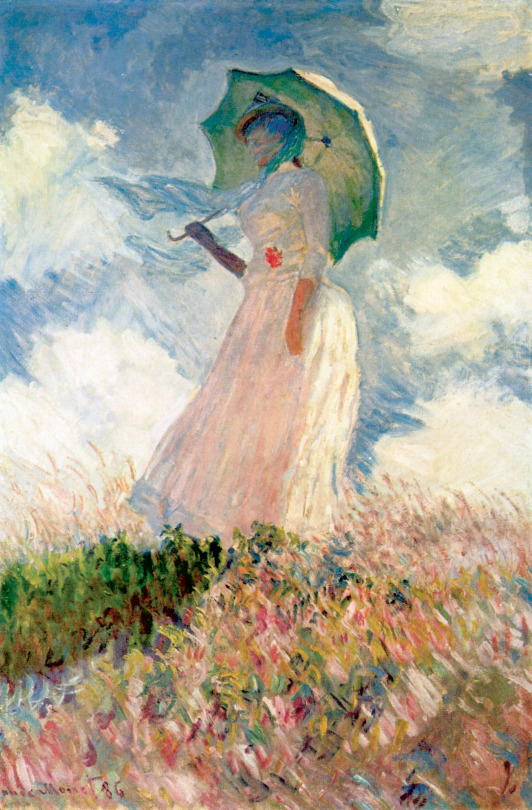
Study of a Figure Outdoors: Woman with a Parasol by Claude Monet
Silent Noon
Your hands lie open in the long fresh grass,— The finger-points look through like rosy blooms: Your eyes smile peace. The pasture gleams and glooms 'Neath billowing skies that scatter and amass. All round our nest, far as the eye can pass, Are golden kingcup fields with silver edge Where the cow-parsley skirts the hawthorn-hedge. 'Tis visible silence, still as the hour-glass.
Deep in the sun-searched growths the dragon-fly Hangs like a blue thread loosened from the sky:— So this wing'd hour is dropt to us from above. Oh! clasp we to our hearts, for deathless dower, This close-companioned inarticulate hour When twofold silence was the song of love.
—Dante Gabriel Rossetti, from The House of Life
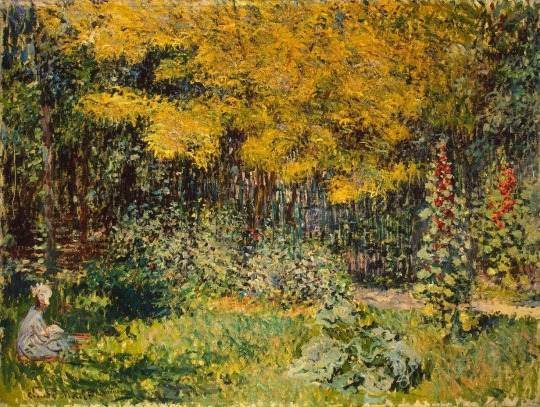
Garden by Claude Monet
#literature#poetry#dark academia#light academia#classic#inspiration#romantic aesthetic#poems and poetry#19th century#romanticism#lord byron#claude monet#victorian art#1800s#solitude#romantic post
3 notes
·
View notes
Text
The Poet
Speaking of Poetry...

Interrupted Reading by Jean-Baptiste Camille Corot
A Ballad of Appeal
TO CHRISTINA G. ROSSETTI
Song wakes with every wakening year From hearts of birds that only feel Brief spring’s deciduous flower-time near: And song more strong to help or heal Shall silence worse than winter seal? From love-lit thought’s remurmuring cave The notes that rippled, wave on wave, Were clear as love, as faith were strong; And all souls blessed the soul that gave Sweet water from the well of song.
All hearts bore fruit of joy to hear, All eyes felt mist upon them steal For joy’s sake, trembling toward a tear, When, loud as marriage-bells that peal, Or flutelike soft, or keen like steel, Sprang the sheer music; sharp or grave, We heard the drift of winds that drave, And saw, swept round by ghosts in throng, Dark rocks, that yielded, where they clave, Sweet water from the well of song.
Blithe verse made all the dim sense clear That smiles of babbling babes conceal: Prayer’s perfect heart spake here: and here Rose notes of blameless woe and weal, More soft than this poor song’s appeal. Where orchards bask, where cornfields wave, They dropped like rains that cleanse and lave, And scattered all the year along, Like dewfall on an April grave, Sweet water from the well of song.
Ballad, go bear our prayer, and crave Pardon, because thy lowlier stave Can do this plea no right, but wrong. Ask nought beside thy pardon, save Sweet water from the well of song.
—Algernon Charles Swinburne

Swallows in Flight, Postcard by A. M. Mailick
The Poet and His Songs
As the birds come in the Spring, We know not from where; As the stars come at evening From depths of the air;
As the rain comes from the cloud, And the brook from the ground; As suddenly, low or loud, Out of silence a sound;
As the grape comes to the vine, The fruit to the tree; As the wind comes to the pine, And the tide to the sea;
As come the white sails of ships O'er the ocean's verge; As comes the smile to the lips, The foam to the surge;
So come to the Poet his songs, All hitherward blown From the misty realm, that belongs To the vast unknown.
His, and not his, are the lays He sings; and their fame Is his, and not his; and the praise And the pride of a name.
For voices pursue him by day, And haunt him by night, And he listens, and needs must obey, When the Angel says: "Write!"
—Henry Wadsworth Longfellow
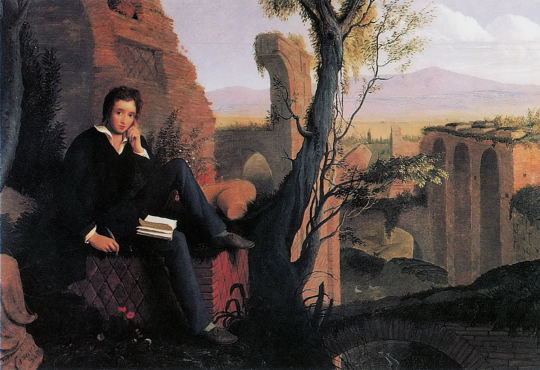
Posthumous Portrait of Shelley Writing Prometheus Unbound by Joseph Severn
On Poetry
Poetry is the record of the best and happiest moments of the happiest and best minds. We are aware of evanescent visitations of thought and feeling sometimes associated with place or person, sometimes regarding our own mind alone, and always arising unforeseen and departing unbidden, but elevating and delightful beyond all expression; so that even in the desire and regret they leave, there cannot but be pleasure, participating as it does in the nature of its object. It is as it were the interpenetration of a diviner nature through our own; but its footsteps are like those of a wind over the sea, which the coming calm erases, and whose traces remain only, as on the wrinkled sand which paves it. These and corresponding conditions of being are experienced principally by those of the most delicate sensibility and the most enlarged imagination; and the state of mind produced by them is at war with every base desire.
—Percy Bysshe Shelley from A Defence of Poetry
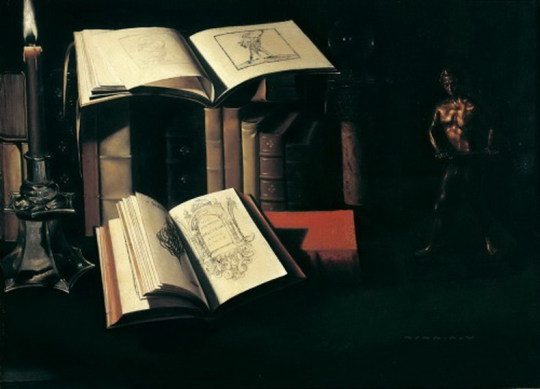
Still Life with Books and Bronze Statue by Sebastian Stoskopff
#literature#poetry#dark academia#light academia#classic#inspiration#christina rossetti#algernon charles swinburne
0 notes
Text
Bright in White
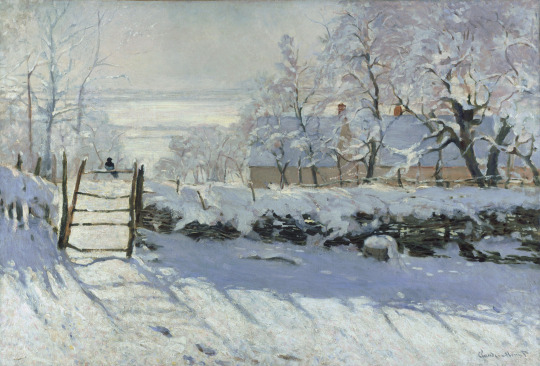
The Magpie by Claude Monet
There Blooms No Bud in May
There blooms no bud in May Can for its white compare With snow at break of day, On fields forlorn and bare.
For shadow it hath rose, Azure, and amethyst; And every air that blows Dies out in beauteous mist.
It hangs the frozen bough With flowers on which the night Wheeling her darkness through Scatters a starry light.
Fearful of its pale glare In flocks the starlings rise; Slide through the frosty air, And perch with plaintive cries.
Only the inky rook, Hunched cold in ruffled wings, Its snowy nest forsook, Caws of unnumbered Springs.
—Walter de la Mare
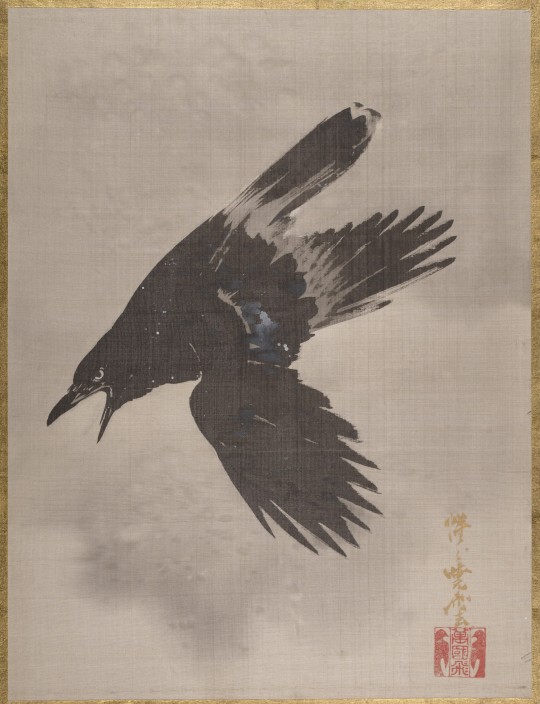
Crow Flying in the Snow by Kawanabe Kyōsai
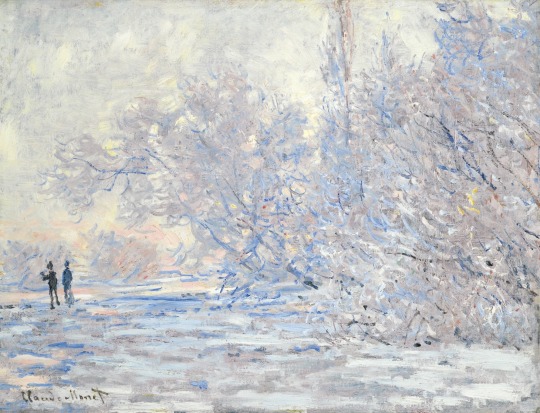
Le Givre à Giverny/Frost in Giverny by Claude Monet
Velvet Shoes
Let us walk in the white snow In a soundless space; With footsteps quiet and slow, At a tranquil pace, Under veils of white lace.
I shall go shod in silk, And you in wool, White as white cow’s milk, More beautiful Than the breast of a gull.
We shall walk through the still town In a windless peace; We shall step upon white down, Upon silver fleece, Upon softer than these.
We shall walk in velvet shoes: Wherever we go Silence will fall like dews On white silence below. We shall walk in the snow.
—Elinor Wylie
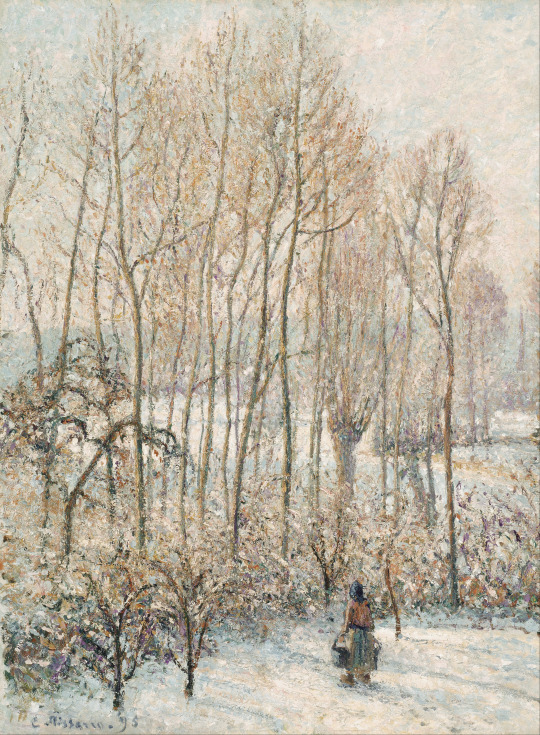
Morning Sunlight on the Snow, Eragny-sur-Epte by Camille Pissarro
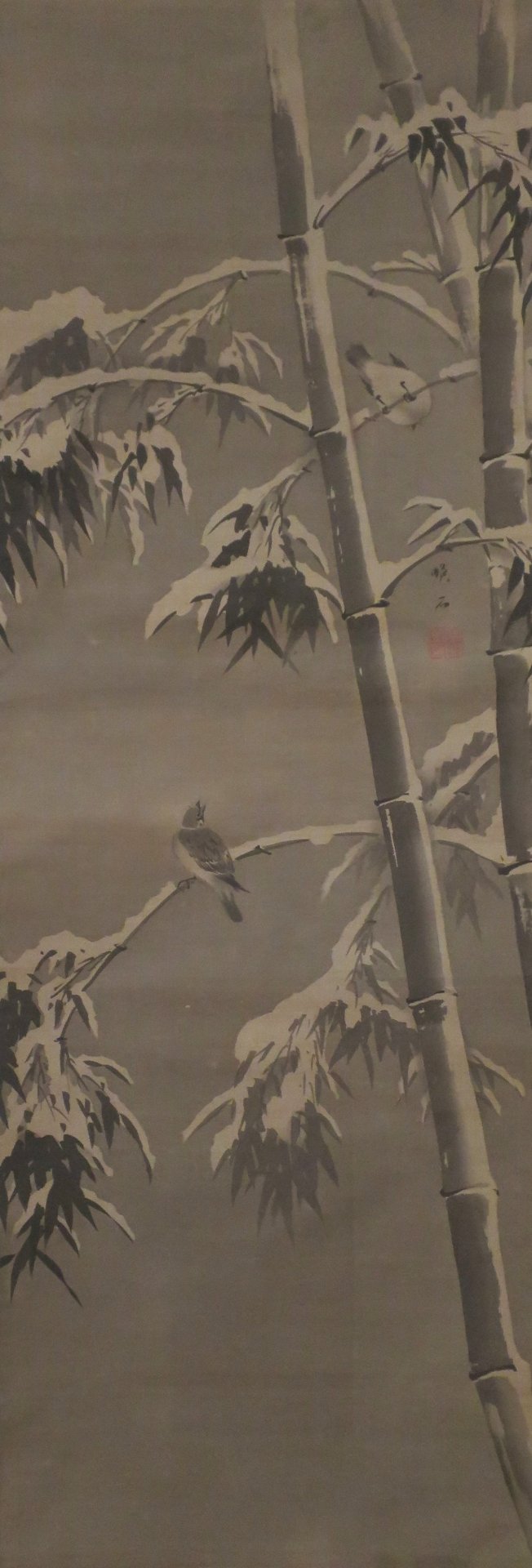
Sparrows on Snowy Bamboo by Murata Bakuseki
Snow in the Suburbs
Every branch big with it, Bent every twig with it; Every fork like a white web-foot; Every street and pavement mute: Some flakes have lost their way, and grope back upward when Meeting those meandering down they turn and descend again. The palings are glued together like a wall, And there is no waft of wind with the fleecy fall.
A sparrow enters the tree, Whereon immediately A snow-lump thrice his own slight size Descends on him and showers his head and eye And overturns him, And near inurns him, And lights on a nether twig, when its brush Starts off a volley of other lodging lumps with a rush.
The steps are a blanched slope, Up which, with feeble hope, A black cat comes, wide-eyed and thin; And we take him in.
—Thomas Hardy
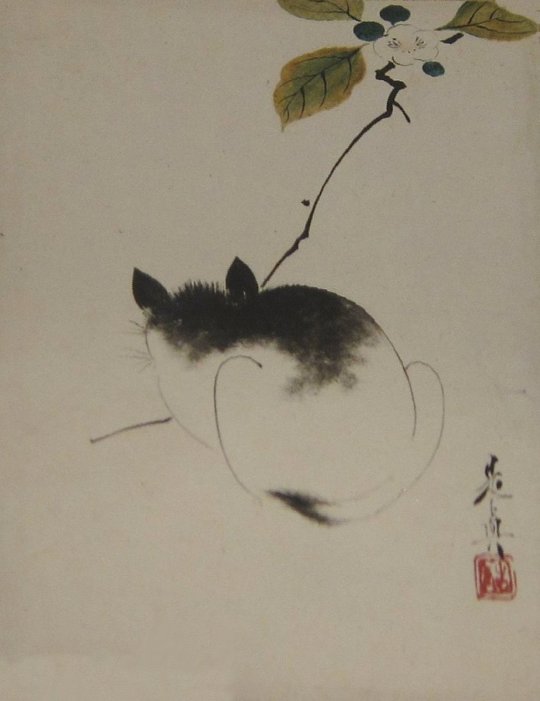
Leaf From an Album of Ten Leaves by Shibata Zeshin
#literature#poetry#dark academia#light academia#classic#claude monet#camille pissarro#thomas hardy#walter de la mare#ink painting#snow#January#inspiration#January Inspiration
2 notes
·
View notes